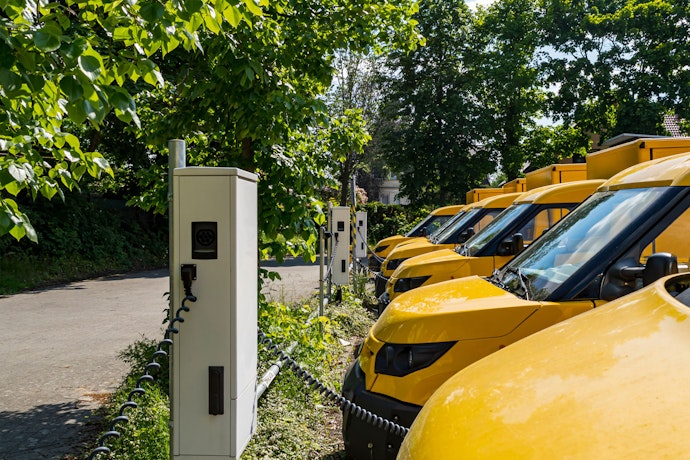How to Reduce Your Expenses
As a fleet owner, your day-to-day costs can quickly add up. What you don’t know is there are further hidden, expensive...
Read more
Green vehicles, also known as eco-friendly vehicles or clean vehicles, are considered more environmentally friendly than those that run on petrol or diesel. Instead, they are powered by alternative fuel or electricity.
Green vehicles come in all different shapes and sizes and include battery electric, plug-in hybrid electrics, hybrid electrics, and biodiesel cars. Other lesser-known types of green transport are hydrogen and fuel-cell vehicles, solar cars, clean diesel vehicles, and compressed-air vehicles to name but a few. The main types of green cars are explained below in more detail:
Battery Electric Vehicles (BEVs): BEVs are powered solely on electricity, which is taken from battery packs in the vehicle. They tend to have a greater output compared to hybrid and plug-in hybrid electric vehicles.
Plug-in Hybrid Electric Vehicles (PHEVs): A PHEV has a gas tank as well as a charging port and can therefore run on fuel if the battery becomes flat or run on electricity if the fuel is all consumed. They tend to have larger battery packs and more powerful electric motors than hybrids.
Hybrid Electric Vehicles (HEVs): The most common form of HEV is the hybrid electric car, but there are also hybrid electric trucks, boats, buses, and aircrafts. With HEVs, all the power comes from fuel, but there is also an electric motor that can assist the fuel-powered engine.
Biodiesel Cars: Not too dissimilar to diesel-powered vehicles, this type of green car has many benefits when it comes to fuel and energy efficiency. Biodiesel is manmade, making it a lot easier for manufacturers to produce as well as making it a lot less damaging to the environment.
The environment benefits the most when it comes to green transport. The main plus points being:
However, the owner of a green car also benefits. Advantages include:
For more information, check out our article on smarter electric vehicle management.
For a vehicle to be green, its emissions intensity should not exceed 120 g/km. This number may not mean much by itself, but when compared to the 2020 average emissions intensity for light SUVs and passenger cars (149.5 g/km) and heavy SUVs and light commercial vehicles (216.7 g/km), there is an obvious difference.²
Electric vehicles, such as green cars, are gaining in popularity in Australia. In 2020, 6,900 electric vehicles were purchased from Federal Chamber of Automotive Industries (FCAI) members — 3,430 from Tesla and 3,470 from other manufacturers. A year prior this number stood at 5,875, 17% less. These sales led to the number of electric vehicles in the Australia vehicle fleet growing by 47% in the space of a year. The change was more prevalent in Australian Capital Territory at 72% and least prevalent in South Australia at 19%. Close to 60,000 hybrid vehicles were sold in 2020, twice as many as the year previous.³
There are currently 18.1 million light vehicles registered in the country and it is estimated that just over 21,000 of these are electric vehicles.⁴
In 2021, the proportion of petrol-powered vehicles was 71.7%, a reduction of 1% from 2020. The proportion of Diesel-run vehicles was 26.4%, an increase of 0.8% compared to the year prior.⁵
The emissions target for 2020 was successfully accomplished and emissions are more than 20% below 2005 levels at the moment (only the EU is further ahead at 23%). This means that Australia is well on track to achieve the reduced emissions target of 26-28% set for 2030. It has even been estimated that emissions will decline by 30-35% if the country keeps up the good work. The Australian Government is working hard to ensure a positive future for its country as well as New Zealand so that the plan to accomplish net zero emissions by 2050 can be realised.⁶
As with most new technologies, there are challenges to be faced and green cars aren’t an exception. Stumbling blocks include:
On the whole, the future of green cars looks positive and as more people purchase green vehicles, more benefits will emerge such as lower battery costs equating to lower vehicle prices, and attractive governmental incentives. As more time and effort is put into combatting climate change and people are becoming more aware of the effects, the demand for green transport will no doubt grow, and the future of transportation will gradually change for the better.
Read more about the future of electric vehicles with Verizon Connect.
1.https://www.goultralow.com/ev-owners/benefits/
2.https://www.ntc.gov.au/sites/default/files/assets/files/Carbon%20dioxide%20emissions%20intensity%20for%20new%20Australian%20light%20vehicles%202020.pdf
3.https://www.ntc.gov.au/sites/default/files/assets/files/Carbon%20dioxide%20emissions%20intensity%20for%20new%20Australian%20light%20vehicles%202020.pdf
4.https://www.ntc.gov.au/transport-reform/light-vehicle-emissions
5.https://www.abs.gov.au/statistics/industry/tourism-and-transport/motor-vehicle-census-australia/latest-release#fuel-type
6.https://www.industry.gov.au/sites/default/files/October%202021/document/the-plan-to-deliver-net-zero-the-australian-way.pdf
Tags: Vehicle Maintenance, Cost Control



Find out how our platform gives you the visibility you need to get more done.
As a fleet owner, your day-to-day costs can quickly add up. What you don’t know is there are further hidden, expensive...
Read moreWith the many choices of GPS tracking software out there, how do you decide which one is best for your fleet business?...
Read moreMichael Chester founded Sun City Plumbing in Geraldton, in 2000. Since, the company has grown from three to 70 employees...
Read more